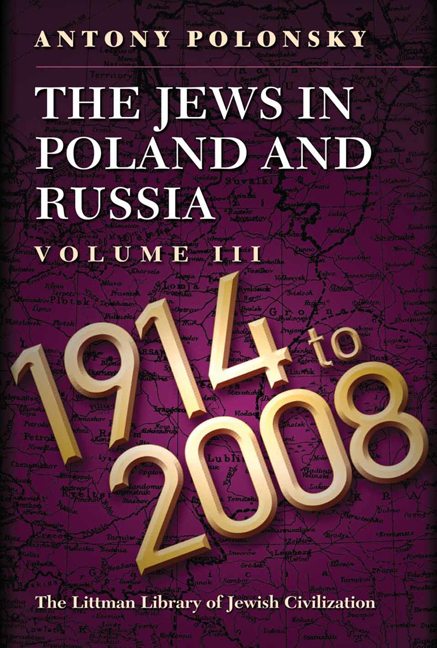Book contents
- Frontmatter
- Dedication
- Acknowledgements
- Contents
- List of Maps
- List of Tables
- Note on Transliteration
- Note on Place Names
- Maps
- General Introduction
- PART I FROM THE FIRST WORLD WAR TO THE SECOND
- PART II WAR AND GENOCIDE, 1939–1944
- PART III FROM THE END OF THE SECOND WORLD WAR TO THE COLLAPSE OF THE COMMUNIST SYSTEM
- EPILOGUE JEWS IN EASTERN EUROPE AND RUSSIA SINCE THE END OF COMMUNISM
- Conclusion
- Glossary
- Bibliography
- Index
2 - The Jews in Polish Political and Social Life, 1921–1939
- Frontmatter
- Dedication
- Acknowledgements
- Contents
- List of Maps
- List of Tables
- Note on Transliteration
- Note on Place Names
- Maps
- General Introduction
- PART I FROM THE FIRST WORLD WAR TO THE SECOND
- PART II WAR AND GENOCIDE, 1939–1944
- PART III FROM THE END OF THE SECOND WORLD WAR TO THE COLLAPSE OF THE COMMUNIST SYSTEM
- EPILOGUE JEWS IN EASTERN EUROPE AND RUSSIA SINCE THE END OF COMMUNISM
- Conclusion
- Glossary
- Bibliography
- Index
Summary
‘It is impossible to describe the exhilaration, craziness, and euphoria of the Polish people in 1918,’ reflected Premier Jędrzej Moraczewski. ‘Triumphant celebrations were launched after one hundred and twenty years. Freedom! Independence! Homeland!’ Everyone wanted to wipe their memories clean, to leave behind for ever the nightmare of the partition of Poland, the snow of Siberia and the drama of uprisings and war trenches.
MARIA KORNATOWSKA, Nowy Dziennik, December 1996Poland accepts … provisions … to protect the interests of inhabitants of Poland who differ from the majority of the population in race, language, or religion.
Article 93 of the Treaty between Poland and the Allied and Associated Powers, 28 June 1919’INTERWAR POLAND: GOOD FOR THE JEWS OR BAD FOR THE JEWS?’
IN AN ARTICLE with this provocative title, Ezra Mendelsohn observed in 1986 that two opposing groups, one ‘optimistic’, the other ‘pessimistic’, can be observed in the historiography of inter-war Polish Jewry. In his words:
The attitude of most Jewish scholars has been, and continues to be, that interwar Poland was an extremely anti-semitic country, perhaps even uniquely anti-semitic. They claim that Polish Jewry during the 1920s and 1930s was in a state of constant and alarming decline, and that by the 1930s both the Polish regime and Polish society were waging a bitter and increasingly successful war against the Jewish population.
This was also the point of view of surviving pre-war Polish Jewish scholars such as Raphael Mahler, Jacob Lestchinsky, and Isaiah Trunk. Similar views were also expressed by the post-war Polish Jewish historian Paweł Korzec and by a number of Israeli historians including Moshe Landau, Shlomo Netzer, and Emanuel Melzer. This standpoint is most clearly expressed by Celia Heller in her book On the Edge of Destruction. Her thesis is clearly encapsulated in the title. In her opinion, the period between the two world wars was a rehearsal for the Holocaust. Polish actions had by 1939 pushed the Jews to ‘the edge of destruction’ and it only remained for the Nazis to complete what the Poles had begun.
This ‘pessimistic’ view of the situation of Jews in inter-war Poland has not gone unchallenged, by either Jewish or non-Jewish historians. The most eloquent of the Jewish ‘optimists’ is Joseph Marcus.
- Type
- Chapter
- Information
- The Jews in Poland and RussiaVolume III: 1914 to 2008, pp. 56 - 97Publisher: Liverpool University PressPrint publication year: 2012

